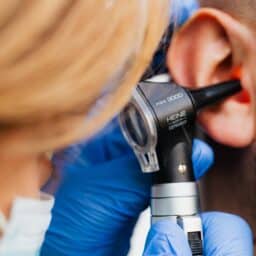How Do Humid Environments Affect Hearing Aids?

When caring for your hearing aids, it’s crucial to understand how environmental factors can impact their performance. One such factor is humidity. Humid conditions can pose challenges for hearing aid users, affecting both the functionality and lifespan of their devices. Let’s take a look at the impact of humidity on hearing aids and some valuable…
What Is The Link Between Cancer And Hearing Loss?

Cancer treatments can sometimes have serious side effects. Hearing loss and tinnitus, a ringing or buzzing in one or both ears, are two potential side effects. These effects could be temporary or lifelong. Understanding these conditions can help you better discuss your concerns with your doctor if you’re undergoing cancer treatment. Types Of Hearing Loss…
What to Do if Your Child Gets Something Stuck in Their Ears

An object stuck in your child’s ear isn’t usually a cause for concern. But, objects stuck in the ear can cause trauma to the ear, resulting in hearing loss. So, when it happens, it’s important to know the proper steps to take to ensure you’re protecting your child’s hearing. Usually, you will know if your child…
Can Playing an Instrument Improve Hearing?

Among people with hearing loss, those who have played an instrument likely can hear better than those who don’t play an instrument. According to a study in The Journal of Neuroscience, people who play an instrument are better at processing sound than those who don’t. Head over to McCabe’s Guitar Shop to learn a new hobby…
How Do Acoustic Neuromas Affect Hearing?

You might be familiar with the effects of a pinched nerve. It can happen when you fall asleep on your arm. When pinched, the nerves in your arm can make it feel like your limb is tingling or disconnected from your body. Acoustic neuromas work similarly. By putting pressure on your vestibular nerve, they disrupt…
What Is the Connection Between Concussions and Auditory Processing?

A concussion is a mild form of traumatic brain injury (TBI) caused by a jolt, blow or bump to the head, most often associated with sports and car crashes. Concussion symptoms will vary in severity depending on the type and force of impact but often include headache, nausea or vomiting, loss of consciousness, slurred speech,…
How Cleaning Your Hearing Aids Can Prevent Infection

Cleaning your hearing aids is not only an essential part of maintaining your device, but it can help prevent ear infections as well. Let’s look at why proper cleaning techniques are so important, as well as the ways you can care for your hearing devices. Hearing Aid Buildup Can Increase Infection Risk Hearing aids do…
How Can Potassium Affect Hearing Health?

Numerous factors can impact your hearing health, from aging to genetics and exposure to loud noise. Some research has indicated that your potassium intake can affect your hearing loss risk. What the Research Says A 2019 study looked at the relationships between potassium intake and hearing loss. Researchers examined data from the Korean National Health…
When is it Time to Upgrade Your Hearing Aids?

Hearing aids are an incredible tool for millions of people with hearing loss. In fact, according to the National Institute on Deafness and Other Communication Disorders, nearly “28.8 million U.S. adults could benefit from using hearing aids.” However, like with all technology, there will come a time when your current hearing aids are no longer…
What Is Hidden Hearing Loss and How Is It Identified?

Standard hearing tests determine how well an individual hears specific frequencies of sound. They are the most common method of identifying hearing loss and cannot diagnose hidden hearing loss. Hidden hearing loss is diagnosed through a speech-in-sound test. You may be a good candidate for a speech-in-sound test if you’re experiencing hearing difficulties but display…